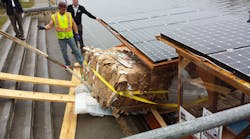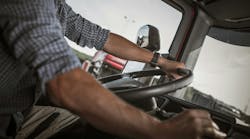In October, the solar electric delivery vessel Solar Sal departed Lockport N.Y carrying 4 tons of cargo. The final destination, 300 miles away, was Cascades Tissue Group’s Mechanicville facility in New York. The vessel is believed to be the first-ever cargo transported across the Erie Canal without the use of any fossil fuels. It was powered exclusively by the sun, its solar arrays and the storage capacity of its onboard batteries.
The vessel was named after the mule in the 1905 song “Low Bridge” after Erie Canal barge traffic moved from mule power to engines.
“Cascades Tissue Group is honored to receive the first shipment of recycled cardboard from Solar Sal,” said Thierry Trudel, Cascades Tissue Group vice president of marketing and communications. “The paper and packaging industry consumes a large amount of air, water and energy so the company is always looking for innovative methods that reduce impact on the environment.”
During Solar Sal’s journey, Professor-emeritus David Borton of Rensselaer Polytechnic Institute, showed how the vessel could proceed solely on just the incoming power from available sunlight. The boat performed well, despite significant overcast and rain for several days. She easily reached her top speed of 7 knots when called for, and in direct sunlight could sustain a 5 knot cruising speed (same as commercial tugs travel in the canals) using only 4kW of power.
The vessel actually runs at its peak performance using only half power. Given that the on board batteries can hold enough charge for an additional 50 mile run after dark, Solar Sal theoretically has no limits for canal usage other than the need for the crew to get a good night’s rest.
Since the solar arrays can deliver 5kW on a really nice day, a reasonable speed can be achieved while more energy flows into the boat’s batteries than it is using – in essence the boat is refueling while underway. Given the nature of their endurance run, the inclement weather required slower speeds to achieve the same effect, but crossing Oneida Lake’s 20 mile length, Solar Sal’s gauges indicated that they were indeed taking on more “fuel” than being consumed by its twin Torqueedo electric motors to do the crossing – this is a very unusual powerboat, indeed!
“Solar Sal returns the sun's power to marine transportation in commercial and recreational ways,” said Professor Borton. “The canals are still available as a vastly underutilized resource for both the environmentally-sustainable delivery of cargo and the carrying of people, whether as a tour boat for hire or a customized, private yacht. That is what we’ve envisioned for Solar Sal.”
“It was fitting that we brought Solar Sal to Mechanicville,” says Chamber of Southern Saratoga County President/CEO Pete Bardunias. “Not only are the city docks the most modern port on the Champlain Canal, but from these docks we have been working with alternative energy marine transportation ever since the sailing vessel Ceres made its trips through Mechanicville in 2013 and ’14. Solar Sal is the first vessel to use absolutely zero fossil fuel, and the dock proved to be a very convenient place to unload its cargo for the final delivery to Cascades.”
Carrying cardboard may not be the best use of Solar Sal’s capabilities, but it was a great way to prove the concept and may pave the way to other ideas. Because the design can accommodate a 12 ton payload it is very versatile, with multiple possible uses. For example, if finished as a private trawler-style yacht, there’s room for a cozy cabin for cruising boaters. Substitute a module with open seating and it could be an equally effective tour boat (the weight of 40 passengers was carried on the delivery voyage). Other possibilities include short haul cargoes of heavy goods, recyclables, trash, or even fuel oil (why use fuel to move fuel?). Finally, Solar Sal could be a useful platform to create floating farmers markets or small scale transportation of food to downstate New York residents.



